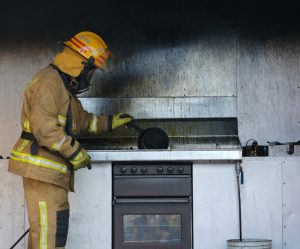Whenever a fire breaks out, one of the first questions anyone asks is, “How did it start?” While the clear majority of fires are accidental, and unintentionally ignited by cooking, cigarettes, electrical failures, lightning, or other causes, there are hundreds of thousands of intentional fires set every year. It’s the job of an arson investigator to make that distinction, and determine not only how a fire was set, but who set it.

Arson investigation relies on a combination of skills and knowledge in fire science, investigations, construction, and human behavior. While some investigators choose to focus on specific types of investigations, such as vehicle fires, hazardous materials incidents, warehouse or storage fires, or any other number of specialties, the general career path is similar for all.
Becoming an Arson Investigator
Most arson investigators begin their careers as firefighters. Through fire academy training, they learn not only the best methods of fire suppression and protecting life and property during a fire, but also about how fires start, and the basics of fire science and behavior. Working as a firefighter also provides exposure to the basics of fire investigation.
For those who wish to move into in arson investigation, specialized education and training in arson investigation is generally the next step. Most enroll in a program specifically dedicated to this purpose, which not only expands upon the basic fire science and investigation principles taught in firefighter preparation programs, but also provides training in the legal aspects of investigation. Arson investigators generally work alongside law enforcement, and are often called upon to serve as experts for insurance carriers and attorneys. This typically means being called as witnesses in arson trials, and therefore investigators must be knowledgeable in the fundamentals of due process, suspect rights, evidence collection and protection protocols, criminal procedure, gathering testimony and interviewing witnesses and suspects, legal ethics, and the court system. A simple mistake could irreparably harm an arson case, so arson investigators must develop their skills, while also practicing impeccable attention to detail and organization.

Upon completion of an arson investigation program, many investigators go on to conduct field work and internships to gain experience. Gaining field experience is vital, as most certifying agencies, including the International Association of Arson Investigators and the National Association of Fire Investigators require minimum levels of experience to earn certification in the field, which is required by most employers for advanced positions. For instance, the IAAI requires investigators to pass an exam, have work experience, and specific types of experience, including with a certified ride-along program and a minimum number of depositions and testimonies. To work for the Bureau of Alcohol, Tobacco, and Firearms, you must have at least two years of training, as well as experience on at least 100 fire scenes under the supervision of a Certified Fire Investigator. In short, experience is important.
Working as an Investigator
Many arson investigators work for local law enforcement or fire agencies, or for federal agencies like the ATF. However, other organizations also hire investigators; for example, law firms may work with arson investigators on a contract basis for individual cases, and insurance companies often have investigators on staff.
The work environment for an arson investigator can be stressful, as there are many pieces to a successful investigation and it can be challenging to connect the dots. Hours can also be inconsistent, as fires occur at any time and at any hour. Arson investigators need to be prepared to be called at any time.
The median pay for an arson investigator, according to the U.S. Bureau of Labor Statistics, is about $58,000 per year, with the highest paid investigators earning close to $100,000 per year. Job growth is about average, with the BLS predicting about a 6 percent increase in jobs over the next decade.
Determining the cause of a fire is not always a simple thing, and when arson leads to a significant loss of property — or even life — it’s important to determine who is responsible to gain restitution and closure for the victims. Determining the difference between intentional fires and accidents can also help support fire prevention and education efforts, and keep future incidents from causing damage.




